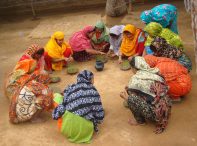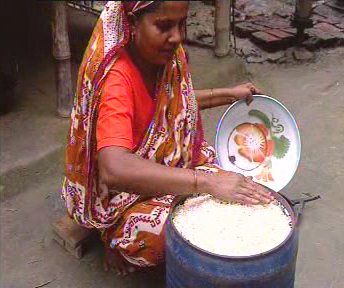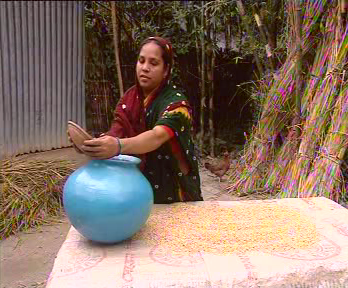Women play a vital role in the production and preservation of seeds. They contribute significantly to the improvement of local seed system in Bangladesh and in other South Asian countries. However, this critical job is only considered as marginal and support function, and men continue to dominate the seed sector. To transition into entrepreneurial roles, women require resources, market access, and a shift in perception.

Rural Development Academy (RDA) Bogra, a pioneering national institution in Bangladesh, works to identify and recognize the need for women’s participation in all seed related interventions. RDA initiated several research programmes to explore how women could become key players in the transformation of Bangladesh’s seed industry. Among the academy’s successful initiatives in rural seed technology development is the Maria Seed Technology Model.
This seed technology model got its name from the village of “Maria”, a densely populated area situated on the bank of river Karotoa in Amrul Union of Shahjahanpur upazila of Bogra, where the residents are dependent in agriculture for their livelihood. In 1999, RDA implemented the “Seed Health Improvement Project” in the village where the farmers were taught about seed preservation. RDA noticed that the women mostly do the seed preservation/management. Around 200 women in the village are involved in the seed business. Noticing this, RDA involved the women in the project, which was a success. Seeing what they have done, around 600 more women in the same village were inspired and did the same thing. These women lifted up the standard of their living, and contributed to the national income. The Maria Model was replicated and validated in different locations. It is nationally and internationally acclaimed and has been exported and is said to be used in West Africa, Nepal, India, and Cambodia.
To further take Maria Model forward, RDA conducted an action research programme with rural women seed growers, and this resulted to the “Women in Seed Entrepreneurship (WISE) Model”, where local NGOs, seed companies, and dealers are involved as partners. The partner institution forms women seed micro-entrepreneur groups. The partners provide training to these groups to enable them to produce and sell quality seeds. By upgrading women’s group to WISE association, the women farmers will have a stronger voice and capacity to negotiate and therefore, be able to operate seed business beyond their community markets and even persuade them to start a seed business. A lot of rural women has also benefitted from this progressive policy. The results of these initiatives demonstrated great potential for women to be at the forefront of the activities within seed production, processing, preservation, and business. Women have demonstrated effective knowledge adoption, improved production practices, and secured higher income after getting involved in seed business. (RDA) ###













Comments are closed